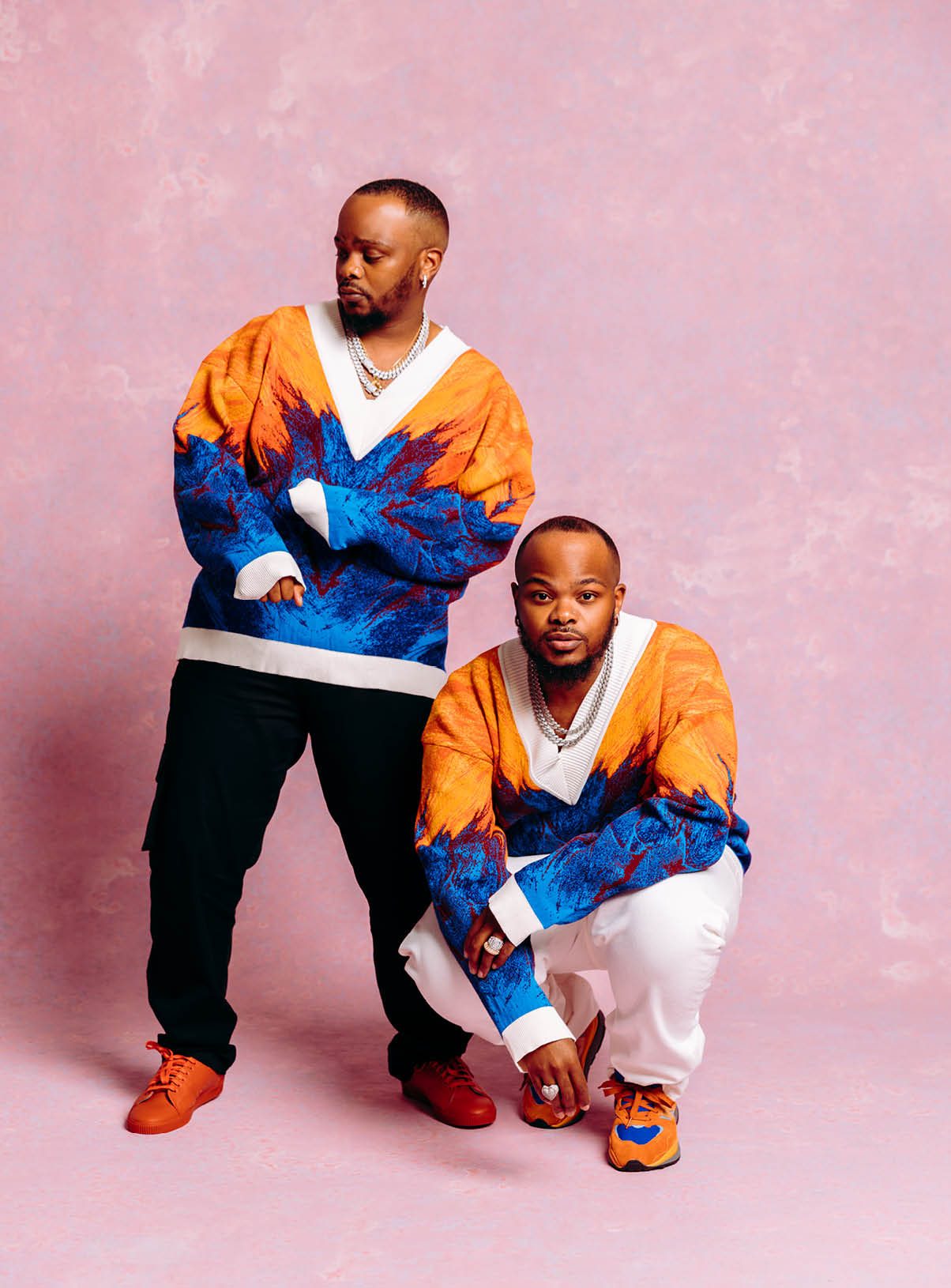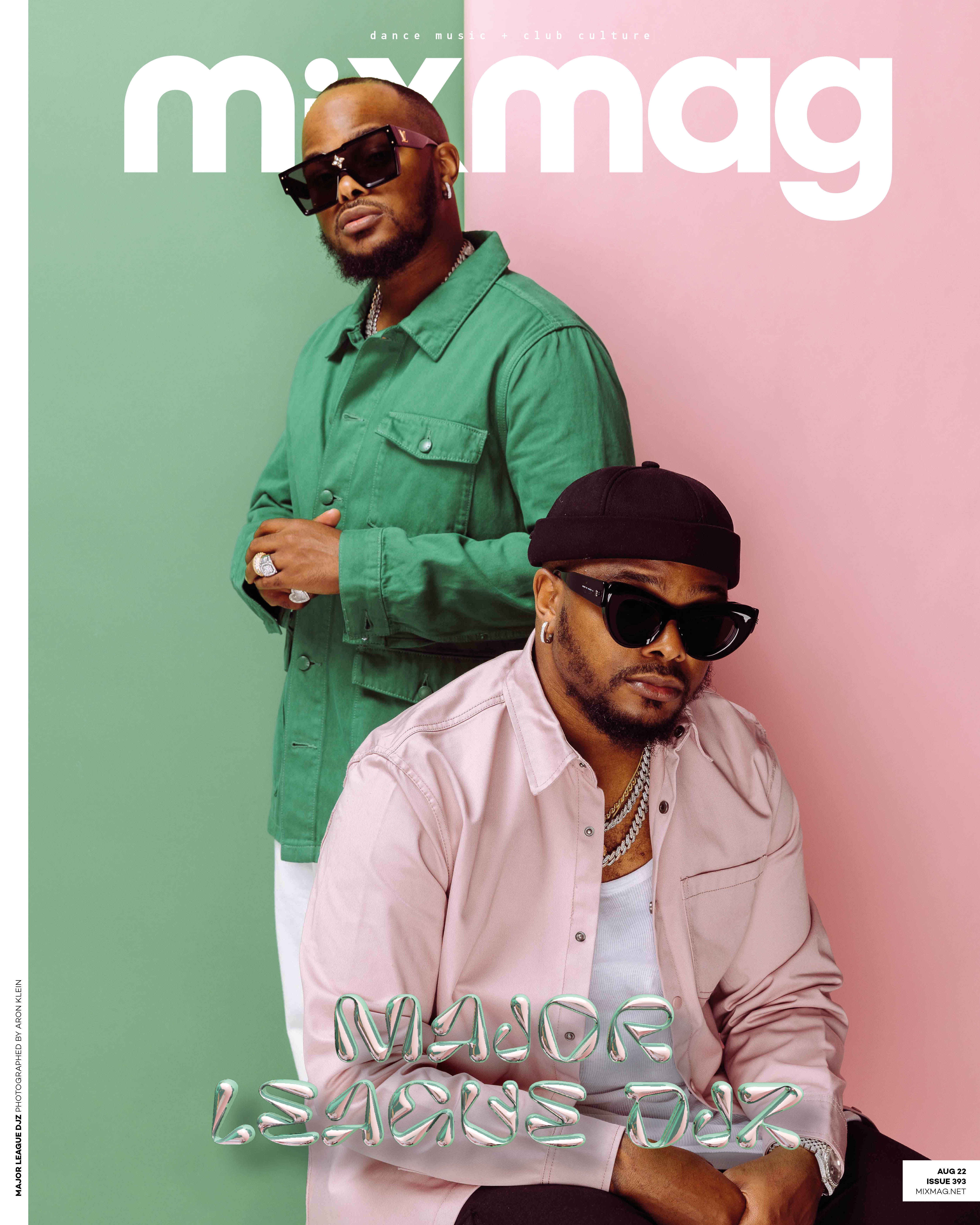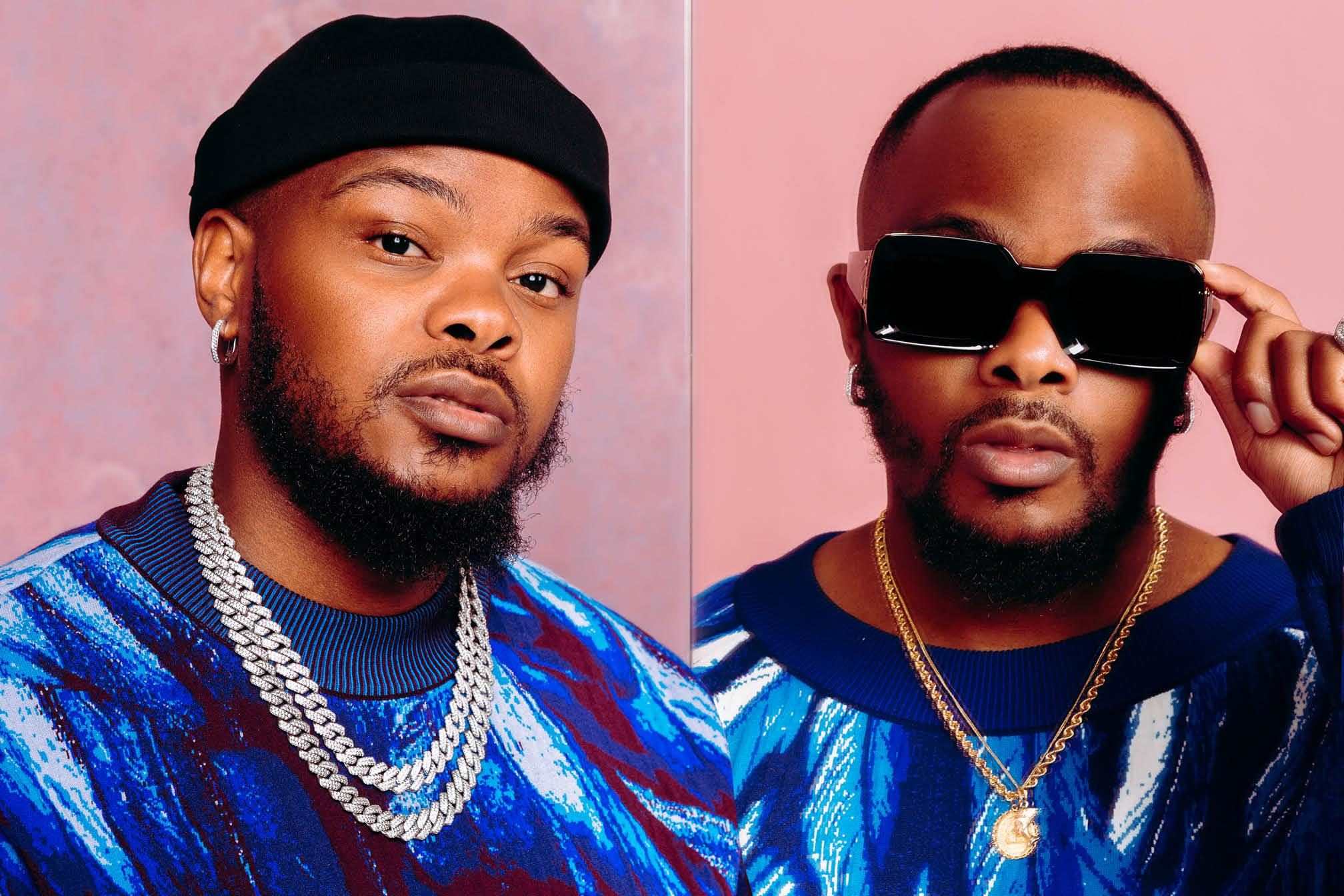 Features
Features
How Major League DJz are powering the global amapiano movement
Natty Kasambala speaks to twin brothers Major League DJz about the community-driven growth of amapiano, developing new talents and taking the sound to the stratosphere
If you type the word ‘amapiano’ directly into YouTube, Major League DJz are a guaranteed top result. Having founded the Balcony Mix format that is pretty much synonymous with the South African house genre at this point, the identical twin DJ/Producer duo born Banele and Bandile Mbere are notorious vibes providers and seamless blenders for a diasporic generation hungry for electronic, yet ancestral, transcendence.
Watch: Major League DJz in The Lab LDN
What started out in South Africa on the rooftops of Johannesburg before expanding into the now international platform it’s become, the series of livestreamed groove mixes has catapulted the twins to global heights as ambassadors of the piano fever and become a perfect tool to showcase the genre’s infectious nature as not just a sound but an entire lifestyle. From the dance moves to the party atmosphere, the brothers have platformed some of the scene’s biggest and best on the channel in b2b spinning sessions that amass views in the millions on the regular.

The first time I connected with the twins, they were in New York after a stint in London last summer, and already had their sights set on big things, giddy and jovial over Zoom from their hotel room. The second time we meet, we link up at a rooftop lounge of a hotel near where they’re staying in Canary Wharf. And though the meetings are less than a year apart, so much has changed and accelerated for them even in that short space of time. From signing a deal with Atlantic Records, to being in the midst of a whirlwind international tour, having sold out O2 Academy Brixton a couple weeks back. After a ton of back and forth trying to pin down a date in their hectic schedule, we finally connect the day after they land back from a gig in Bali, Indonesia. Naturally jet-lagged and probably sleep-deprived, the second encounter is a quieter one, though the boys are still accommodating and warm up with time.

Originating from and inspired by the sounds of kwaito, Afro house, gqom, jazz and the hip hop lyricism of a lot of its vocalists, amapiano captures a uniquely modern South African concoction that speaks as much to the energy of electronic and dance music as it does to the spirituality and grounding of its more traditional African elements. With drum patterns that can often be felt in the sternum when blasted live and lyrics often spoken or sung in non-English languages, even with its rapid growth outside of its country of origin, there’s little compromise made to water it down for a Western audience. So far it’s infiltrated the music of folks like Rema, Burna Boy, Wizkid and intoxicated the likes of Drake, Diddy, heck even Fat Joe.

“The spirit of amapiano right now to me is African dance music that brings the world together,” Bandile states proudly. Banele agrees before adding: “It breeds African soul. I think that’s why it’s even brought Africa closer together, or brought South Africa closer to [the rest of] Africa.” And they’re right. The pan-African energy of the movement has found artists from across West Africa, East Africa and other parts of Southern Africa immersing themselves in the sound and even collaborating with South African artists on tracks — the branches of amapiano are continuing to sprout, albeit to some mixed reception from the genre’s purists. To Banele though, it’s pretty simple. Those wanting to jump on the wave are more than welcome to if they do it the right way: “They must go to where the sound is being purified, learn and inherit from that, bring people in who started with it so it helps to actually grow the sound.”

When it comes to its presence here in the UK, the duo’s sold out Brixton show seemed to signify a natural but sizable shift, with what felt like the entire London music scene and beyond in attendance. Banele brands London as “one of the first places to get it” before revelling in the opportunity to demonstrate the scale and power of the South African sound to sit alongside the likes of Afrobeats that are forging new grounds in terms of commercial success here too. With an uncharacteristically late curfew for the South London venue of 3:AM, the night saw Sef Kombo and Kitty Amor go B2B before DJ Neptizzle got the crowd singing along ahead of the headliners. When the Major League boys hit the stage, it was a fully immersive experience with projected lights, dancers, entourage and live vocals too — the only comparison being Black Coffee’s own headline show at the venue about five years prior. Even with all that however, it still wasn’t enough to satiate the buzzing audience, with videos of crowds dancing in the streets (and on top of cars) after curtains peppering social media. They laugh when I mention it and Banele admits: “Yeah we’re very used to that. But it’s been amazing to see how different people dance and vibe to it in different places.” If anything, the boys say their only regret is not doing a longer set: “We would have loved to do a few more hours to show even more of the story and take them on the journey of amapiano.”

Amapiano as it stands today has expanded to include a number of factions — from Bacardi-tinged to tech to the softer, more spiritual anthems, right through to what some call ‘private school’ 'piano that borders on tropical house and gets the nickname from its perceived more classy demeanour. Other than it being “the heartbeat of Africa” as the Bandile simply puts it, when breaking down the common elements that thread through all of these subsections to qualify them as amapiano, one of the key aspects the twins mention is patience. The tracks are known for length and slow build crescendos that might take minutes before you hear first vocals, if ever. Likening this approach most to house music, Banele says “you have to let the beat do what it’s supposed to do,” something he thinks isn’t always understood by its newer adopters.
Read this next: Scorpion Kings: "Amapiano hasn't even reached its full potential"
Though the boys were born in Boston in the United States due to their father being exiled during Apartheid, the twins moved back to South Africa as kids after Nelson Mandela began his presidency and were raised there for most of their lives. Amapiano has served as this medium through which they can connect even further with their heritage, along with so many of its listeners and artists, many of whom made their starts in SA hip hop and rap. Bandile notes how essential the timing has also been to its ascension: “I think amapiano also came at the right time where the world was actually looking at Africa and different elements. Even within Africa the same was happening, a lot of people are looking at their roots.” From the language and incantations evoked, amapiano is distinctly and unapologetically South African, which is a huge part of its refreshing appeal. Saying that, there’s also a cultural fluency and perspective to the brothers that feels crucial in how they’ve been able to move between worlds so effortlessly and view their involvement within the story of the genre with such a global and ambitious lens.

Given their start into the industry throwing and hosting parties and afterparties as teenagers for local and international talent before eventually mastering DJing and then starting their own festival, Major League Gardens, it’s no surprise that the pair have become connectors for the genre. Bandile, the slightly quieter of the two siblings, unpacks how the mixes became the perfect answer to a question they’d been asking themselves as they ventured further into the DJ/producer category: “How do we dominate in the dance side and also give our mixes a lifestyle too? The live mixes really allow people to see exactly what the genre represents, so they understand the levels.” Now with grooves situated everywhere from the top level of a vintage red bus in London to bouncing gyms, the beaches of Mexico to fashion stores in New York City, featuring production staples such as Kabza De Small, Mr. JazziQ, Vigro Deep and DBN Gogo to vocal talent like Daliwonga, Focalistic and Cassper Nyovest, their channel is a hub and conduit for those looking to dive into the world of South African party culture. And during the pandemic, the comments left under videos started to grow in numbers along with the views and feature shoutouts from increasingly further flung places (the twins’ very own ‘Come To Brazil’ moment’). Not before long the mixes became a hefty springboard bringing South Africa’s newest wave of talent to the world.

It’s clear from the breadth of artists and DJs involved, as well as the releases, that so much of amapiano’s success is a community effort. In fact, you’ll be hard pressed to find an amapiano hit that features just one producer and one vocalist - usually they feature a number of each working in collaboration. “I think that’s why amapiano has been so strong,” Banele observes, “because there are so many minds that can come together to work on one thing. We’ve got a culture where we’re always just sharing music and building.” And alongside the community spirit of it, the genre is also about as democratic as it gets, with many of its biggest tunes building heat in the streets first via Whatsapp forwards and word of mouth, and many of the sound’s current biggest hitters rising through the ranks from relative obscurity.

For Bandile, the opportunities opened up for the younger generations is the most important part of this moment they find themselves in. “I really care about showcasing and building a runway for the youth so they know exactly what to do after us, and there’s just so much talent in South Africa.” The twins are working to promote the genre worldwide and develop new talent by taking part in Nando’s Mix It Up campaign, a project that pairs South African and UK artists to collaborate on tracks, enabling young South African producers BL Zero, MDU aka TRP, TO Starquality and Tumza and vocalist Basetsana and Aymos to work with UK stars such as M1llionz, Bru-C, BERWYN and Miraa May and introduce them to the impactful sound of amapiano. “It's taking young amapiano producers and putting them together with UK artists and seeing what they can make out of that collaboration,” explains Bandile. “There's not a lot of people actually putting money back into amapiano, even though it's one of the biggest genres in Africa. So the fact that Nando's came up with this initiative alone is pretty mind-blowing to me.”
Read this next: The beautiful chaos of Amapiano, South Africa's emerging
The amount of talent in amapiano is undeniable. One of the most remarkable parts of the genre has been the sheer creativity of amapiano’s key players and fans alike. From viral dance trends to how seamlessly people move from dancers or emcees within the scene to hit-making producers and artists — it’s a fluid and exhilarating ecosystem to be a part of. “For a lot of people, amapiano has changed their lives. Even for us, we’re so thankful for the sound.”

Now that the genre has started changing lives and providing hope for a new generation of South Africans, the DJz have no intention of letting it die down. To put it simply, they have their sights set on world domination and they want to bring everyone along with them too. They dream of conquering the dance music mecca of Ibiza, a Cercle set (at a striking historical African location), venturing into new continents, bigger venues and festivals and the biggest names on the features lists. Bandile mentions Rihanna, Beyoncé, even Adele as Banele smiles and summarises with a breezy shrug, “we’re already on the mission of amapiano to the world, so the next part has to be space.”
Natty Kasambala is a freelance writer, follow her on Twitter


